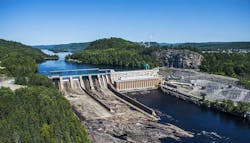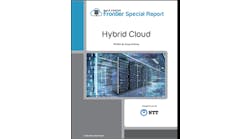In the latest sign of momentum for Quebec as a destination for hyperscale data centers, COLO-D has announced plans to build a 150-megawatt data center campus near Montreal. The region has seen robust growth in recent years, building on its abundant supply of affordable hydroelectric power.
Large cloud computing providers love cheap green power, and several have made Montreal the focal point for their infrastructure expansion in Canada. Both Google and Amazon Web Services have opened cloud regions in Montreal in recent years.
COLO-D has an unnamed anchor customer lined up for its massive new campus, which is among a handful of new cloud campuses to support growing hyperscale needs for new capacity.
“With our new D3 campus, we will become one of North America’s leaders in providing wholesale data center solutions,” said Patrick David, COLO-D president and CEO. “We are excited to offer a rich and unique ecosystem of data centers for customers looking to implement large-scale solutions in a region that is becoming a global data center hub.”
Boosting its Capacity
The new COLO-D campus will be located in Saint-Bruno-de-Montarville, about 10 miles from downtown Montreal. The company will also add 15 megawatts (MWs) of new capacity at its D2 facility in Longueuil, which already supported 35 MWs. These facilities, along with the 20 MW D1 campus, will provide COLO-D with a total capacity of 220 MWs of data center capacity.
The 500,000 square foot D3campus will feature three 50 megawatt data centers, and be powered by two redundant 315 kV electrical feeds, each serviced by two separate substations. This strategic location is considered to have one of the most reliable and secure supplies of electrical power in North America.
COLO-D connects its facilities with redundant and diverse fiber paths, including links to international telecom hubs.
COLO-D is part of a growing data center industry in Montreal. Colocation and interconnection specialist Cologix has long been the leading multi-tenant operator, operating seven data centers in Greater Montreal. In recent years it has been joined by a group of wholesale data center specialists, including COLO-D and ROOT Data Center, which have won deals with larger hyperscale customers. A recent addition is eStruxture, which has acquired several established providers in the Montreal market.
Leading With Hydro Power
As cloud computing providers continue to build out their global platforms, they have been adding capacity in Canada. One motivation is complying with data residency regulations, as having a physical facility in Canada is critical to winning government IT business. The Canadian government has released a cloud adoption plan which restricts storage of sensitive data to facilities located within Canada. It’s one of a number of countries focused on retaining data within national borders, driven by concern about revelations of NSA surveillance programs. This has prompted cloud providers to deploy in-country infrastructure in more locations.
Within Canada, Montreal has benefited from its abundant supply of hydro power, which is is available at cheaper prices than electricity options in Toronto. Hydro-Quebec offered an average power rate of just 5.2 cents per kW in 2016, according to site selection specialist JLL, compared to the 10.3 cents per kW in Toronto. Hydro Quebec touts rates for data centers as low as 2.48 cents, which would be equivalent with the most affordable U.S. power in Quincy, Washington (which is also supported to utility-scale hydro-electric generation).
That cheap power has also made Quebec attractive to cryptocurrency operations, who seek massive amounts of power to establish mining facilities to secure the blockchain.






